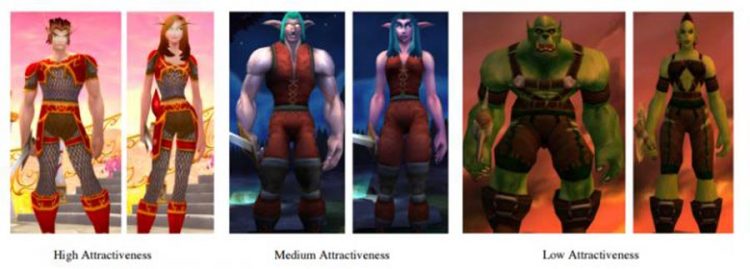Real stereotypes continue to exist in virtual worlds

This image shows three levels of attractiveness in avatars from World of Warcraft. © World of Warcraft/Blizzard Entertainment
In a study of how people interacted with avatars in an online game, women received less help from fellow players than men when they operated an unattractive avatar and when they used a male avatar, said T. Franklin Waddell, a doctoral candidate in mass communications, Penn State.
“It doesn't matter if you have an ugly avatar or not, if you're a man, you'll still receive about the same amount of help,” said Waddell, who worked with James Ivory, associate professor of communication, Virginia Tech. “However, if you are a woman and operate an unattractive avatar, you will receive significantly less help.”
Waddell said the findings, which were released in the recent issue of the Journal of Broadcasting and Electronic Media, are similar to those in previous research on how appearance stereotypes affect men and women in the real world. There, women are more likely to suffer negative consequences based on their appearance than men are, he said.
“Overall, many of the same gender and sexual stereotypes seem to permeate the online worlds,” Waddell said. “The study supports the idea that our responses to stereotypes and norms follow us from real life into virtual environments.”
In another finding, players were less likely to help a woman who controlled a male avatar than a man who controlled a female avatar.
“Although woman are typically less penalized for engaging in cross-sex behavior than men in offline settings, we found an opposite pattern in the online setting, such that men were allowed to control either a male or female avatar without penalty, whereas women were penalized for controlling an opposite-sex avatar,” Waddell said. “In other words, when the stereotype would typically benefit women, the pattern was flipped in the virtual world, allowing men to engage in 'gender bending' with their avatar, whereas women were not encouraged to. So it truly is a lose-lose for women in online settings, according to our study.”
The findings suggest that businesses may want to offer fewer, not more, options if workers use avatars to interact with colleagues or customers, according to the researchers.
“Businesses often want to provide employees and customers with as many technological options as possible,” said Waddell. “However, if business people are going to use avatars to interact with each other or with customers, they may want to use avatars that are gender neutral, for example, or they risk bringing all of those stereotypes from the real world into their online environments.”
The researchers used six different avatars to study reactions to help requests among 2,300 players of the online game, World of Warcraft. The avatars represented male and female creatures across three different levels of attractiveness. Prior to this study, participants had evaluated the levels of attractiveness as high, medium and low.
During an online session, a researcher would approach a player with a request for directions in the game. To test the magnitude of the favor, the researcher either asked the player to provide directions to a site in the game — a small favor — or asked the player to actually guide the researcher to the site — a large favor. The researchers used other cues to signal the sex of the operator.
“For example, if I approach a player, I might say, 'Can you help a guy out?' to signal that I was a male operating the avatar,” said Waddell. “If I wanted to signal that I was a female operator, I would say, 'Can you help a girl out?'”
Media Contact
All latest news from the category: Social Sciences
This area deals with the latest developments in the field of empirical and theoretical research as it relates to the structure and function of institutes and systems, their social interdependence and how such systems interact with individual behavior processes.
innovations-report offers informative reports and articles related to the social sciences field including demographic developments, family and career issues, geriatric research, conflict research, generational studies and criminology research.
Newest articles

NASA: Mystery of life’s handedness deepens
The mystery of why life uses molecules with specific orientations has deepened with a NASA-funded discovery that RNA — a key molecule thought to have potentially held the instructions for…

What are the effects of historic lithium mining on water quality?
Study reveals low levels of common contaminants but high levels of other elements in waters associated with an abandoned lithium mine. Lithium ore and mining waste from a historic lithium…

Quantum-inspired design boosts efficiency of heat-to-electricity conversion
Rice engineers take unconventional route to improving thermophotovoltaic systems. Researchers at Rice University have found a new way to improve a key element of thermophotovoltaic (TPV) systems, which convert heat…



